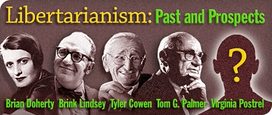Many issues have been raised, let me offer a few comments:
1. In response to Tom, I am a pluralist and I also value (libertarian) freedom for its own sake. But in most settings I value “positive freedom,” or capabilities, a good deal more. Positive freedom or positive liberty are common philosophical concepts, and I don’t see why they need be confusing. Isaiah Berlin for one straightened out the confusion some time ago. Note also that 1939 Germany was on an unsustainable path with regard to positive liberty, we all know what happened. The notion of positive liberty need not endorse such a state of affairs, plus of course libertarian rights matter too, just not as absolutes.
2. I tend to be strict in thinking that rule utilitarianism (or consequentialism) collapses into act utilitarianism. I also think that principles are contingent, and we are best off talking in terms of what really matters about outcomes and comparing it directly.
3. Al Qaeda is not only dangerous in its own right, it is also likely to provoke overreactions from nation-states. The two problems are not totally separate by any means. Nuclear weapons in the hands of terrorist groups, once that happens, threaten the very possibility of civilization.
4. I strongly agree that welfare programs should be targeted to the poor, and not serve as comprehensive transfer programs. I’ve blogged on this many times and, of course, I am hardly “sitting out the fight” or taking every aspect of the current welfare state for granted. That said, don’t expect governmental welfare to go away completely in the United States. That is a losing battle.
5. I don’t see much hope for a libertarian alliance with the left.
6. Once private corporations had the organizational wherewithal to get large in the late 19th century, governments got big too. There is an important lesson there. Technology, and to a lesser extent slavery, are why earlier American governments were often so small. The influence of classical liberal ideology is often overrated here. Somehow recapturing this past ideology won’t do the trick and it does not stand as an option.
7. Many of the blogger critics are not taking me literally enough. They read something I write and lump my views in with other people who make similar points but who hold many other opinions as well.
8. In closing, I’d again like to express my appreciation for Brian and his book.

